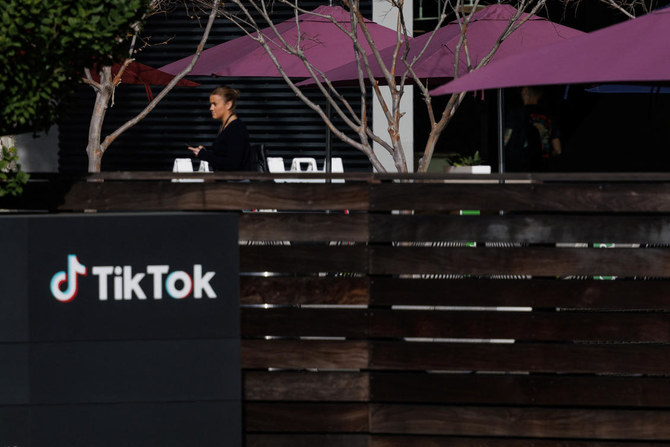WASHINGTON: The US House of Representatives overwhelmingly approved a bill on Wednesday that would force TikTok to sever ties with its Chinese parent company or be banned in the United States.
The legislation is a major setback for the video-sharing app, which has surged in popularity across the world while causing nervousness about its Chinese ownership and its potential subservience to the Communist Party in Beijing.
The lawmakers voted 352 in favor of the proposed law and 65 against, in a rare moment of unity in politically divided Washington.
The warning shot against the app caught many by surprise as both Republicans and Democrats risked the wrath of TikTok’s passionate young users in an election year when the youth vote will be key.
“Today’s bipartisan vote demonstrates Congress’ opposition to Communist China’s attempts to spy on and manipulate Americans, and signals our resolve to deter our enemies,” Republican House Speaker Mike Johnson said after the vote.
“I urge the Senate to pass this bill and send it to the President so he can sign it into law.”
But the fate of the bill is uncertain in the more cautious Senate, where some are apprehensive about making a drastic move against an app that has 170 million US users.
President Joe Biden will sign the bill, known officially as the Protecting Americans from Foreign Adversary Controlled Applications Act, into law if it comes to his desk, the White House has said.
“This process was secret and the bill was jammed through for one reason: it’s a ban,” said a spokesperson for TikTok in a statement.
“We are hopeful that the Senate will consider the facts, listen to their constituents, and realize the impact on the economy, 7 million small businesses, and the 170 million Americans who use our service.”
After the vote, TikTok CEO Shou Zi Chew urged the app’s users in the United States to speak out and share their stories, including with their senators.
“We will continue to do all we can including exercising our legal rights to protect this amazing platform that we have built with you,” he said in a video posted on social media platform X.
“We believe we can overcome this together... Protect your constitutional rights. Make your voices heard.”
Majority leader Chuck Schumer, who will need to back the bill, remained non-comital, saying only that the Senate “will review” the legislation when it comes over from the House.
The measure, which only gained momentum in the past few days, requires TikTok’s parent company ByteDance to sell the app within 180 days or see it barred from the Apple and Google app stores in the United States.
It also gives the president power to designate other applications to be a national security threat if they are under the control of a country considered adversarial to the United States.
The renewed campaign against TikTok came out of the blue to the company, the Wall Street Journal reported, with TikTok executives reassured when Biden joined the app last month as part of his campaign for a second term.
Chew is in Washington, trying to stop progress on the bill.
China warned on Wednesday that the move will “inevitably come back to bite the United States.”
“Although the United States has never found evidence that TikTok threatens US national security, it has not stopped suppressing TikTok,” foreign ministry spokesperson Wang Wenbin said, condemning it as “bullying behavior.”
Republican lawmakers approved the bill, in an unusual act of defiance against Donald Trump.
In a turnaround from his earlier stance, Trump on Monday said he was against a ban, mainly because it would strengthen Meta, the owner of Instagram and Facebook, which he called an “enemy of the people.”
When Trump was president, he attempted to wrest control of TikTok from ByteDance, but was blocked by US courts.
“I think it will die in the Senate,” said Representative Nancy Mace, a Trump ally. “This is not our job to do this.”
Other efforts to ban TikTok have failed, with a bill proposed a year ago getting nowhere largely over free speech concerns.
Similarly, a state law passed in Montana banning the platform was suspended by a federal court on the suspicion that it violated constitutional free speech rights.
TikTok staunchly denies any ties to the Chinese government and has restructured the company so the data of US users stays in the country with independent oversight, the company says.





























